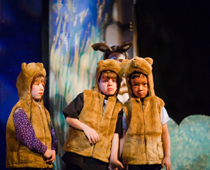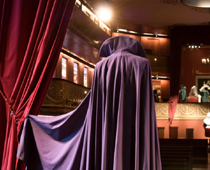
Test your skills on writing playscripts in this quiz.
Writing Playscripts
Get ready to dive into the exciting world of writing playscripts with this KS2 English quiz! Playscripts are like written versions of plays, and they're super fun to create, especially if you love writing dialogue and being in charge of the story.
When writing a playscript, you have to think differently than when writing a story. You get to guide the actors on how to move, what to say, and how to say it. Let's see how well you remember the rules of writing playscripts - take this quiz and have some writing fun!
Quizzes: Your Ticket to Fun Learning. Dive InTo see a larger image, click on the picture.
1.
Where would you look to find the names of all the characters in a play?
In a list before the first act.
In the title.
In an index.
In the glossary.
The list of characters used to be called the 'Dramatis Personae' (which just means 'the persons of a drama'). If the list includes the names of the actors playing each part, it is called the 'cast list'.
2.
3.
4.
5.
6.
7.
8.
9.
A deserted park. Dusk. What is the purpose of stage directions like these?
The author adds these directions to make the playscript more interesting for the actors.
These lines should be projected above the stage.
To set the scene.
An actor should read these lines.
Different backdrops and props can be used to show where a scene is set.
You can find more about this topic by visiting BBC Bitesize - Performance writing: Analysing play scripts
**Unlimited Quizzes Await You! 🚀**
Hey there, quiz champ! 🌟 You've already tackled today's free questions.
Ready for more?
Ready for more?
🔓 Unlock UNLIMITED Quizzes and challenge yourself every day. But that's
not all...
not all...
🔥 As a Subscriber you can join our thrilling "Daily Streak" against other
quizzers. Try to win a coveted spot on our Hall of Fame Page.
quizzers. Try to win a coveted spot on our Hall of Fame Page.
Don't miss out! Join us now and keep the fun rolling. 🎉
**Unlimited Quizzes Await You! 🚀**
Hey there, quiz champ! 🌟 You've already tackled today's free questions. Ready for more?
🔓 Unlock UNLIMITED Quizzes and challenge yourself every day. But that's not all...
🔥 As a Subscriber you can join our thrilling "Daily Streak" against other quizzers. Try to win a coveted spot on our Hall of Fame Page.
Don't miss out! Join us now and keep the fun rolling. 🎉

















